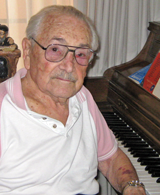Abe Meth, who turns 100 years old on June 3, says he’s never wasted an hour in his life. “I always find work,” he says.
Since 1978, when Meth and his late wife, Lillie, moved to Arizona, Meth has volunteered at Temple Beth Shalom in Sun City and at Beth El Congregation in Phoenix. On Friday nights, he reads Torah at Temple Beth Shalom and on Shabbat and holiday mornings, he reads Torah at Beth El. Through the years, he has done countless hours of volunteer work at the two synagogues.
In honor of Meth’s birthday, Beth El will have a kiddush on Saturday, June 2, after the service. Temple Beth Shalom will host a dinner on May 26; Meth will give a lecture on the Ten Commandments for Shavuot.
But that’s only part of the program. A representative from the International Raoul Wallenberg Foundation will be on hand to honor Meth’s work for saving thousands of Jews during World War II.
Wallenberg was a Swedish diplomat stationed in Nazi-occupied Hungary, who saved the lives of tens of thousands of Jews at the end of World War II. He created a protective passport, or Schutzpass, to ensure the carrier that he or she was under the protection of the Swedish government. The Schutzpass also exempted the holder from wearing the yellow star of David, which all Jews were required to wear.
Wallenberg bought a glass-factory warehouse in Budapest to provide shelter for Jews, and established his headquarters there. He also bought several other buildings to house Jews. “He was a very wonderful man and really put his life in danger for the Jews,” Meth says.
“When people in the labor camps heard about it, they tried to escape and very often hundreds of people were mingled in front of (the building) trying to get in.”
Meth, his wife, their 17-month-old son, Joseph, and Meth’s parents lived in the glass-factory basement from October 1944 to February 1945 with hundreds of other Jews. “There was only one light hanging on a string and we were fed beans and bread that the Swedish government provided us. Only women and children were allowed to sit or lie on the crates and the men had to sit wherever they could find a place,” he says.
During that time, Meth helped Wallenberg forge the Shutzpasses because he was a skilled calligrapher. “Wallenberg saved thousands of Jewish people through his maneuvering,” Meth says. “He never really mixed with the people, but he was always working in the background.”
After the war, the Meths went back to Budapest to try to make a life there. “Most houses were burned or damaged,” he says. A trained teacher, Meth was given an opportunity to study school systems in the United States. “I came (to the United States) in 1947, made contact with congregations and got a contract as a Hebrew school teacher. Based on that, I got a visa and could bring my family,” he says.
Meth then spent 32 years as the ritual director of Conservative Temple Beth Shalom in Kansas City before “retiring” in the Valley in 1978. His daughter, Agnes Oblas, lives in Ahwatukee.
Meth is currently working on preparing the opera he wrote, “From the House of Bondage” for an October performance at Beth El. The manuscript was recently damaged by moisture while in storage. (See “A life’s work in music,” Jewish News, Oct. 19, 2007.)
He continues to participate in activities at the two synagogues. “I’m still active and I do whatever I can,” he says.

